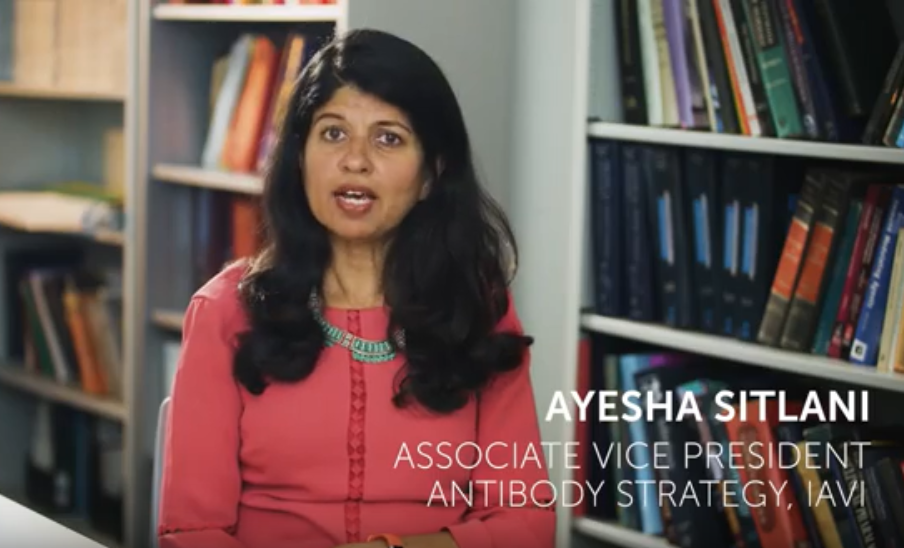September 19, 2019
Working Toward Global Access to Affordable Antibodies
Ayesha Sitlani describes an approach to making antibody-based preventives and treatments globally accessible.

Ayesha Sitlani, Ph.D.
Associate Vice President, Antibody Strategy, IAVI
Monoclonal antibodies (mAbs) are safe and effective treatments for many chronic diseases, including certain cancers and immune disorders. In high-income countries and private insurance markets over the past two decades, they have had a transformative impact on human health and medical practice. The treatments, however, are expensive. Because of their high costs, they have had limited impact in low- and middle-income countries (LMICs), where people must largely rely on older, less effective therapies that may have significant side effects. We at IAVI, along with our colleagues across the global health community, believe that all people should have access to the most effective treatments. Accordingly, we are working with partners to launch a set of initiatives to make mAb treatments and preventives affordable and globally accessible.
Public-private partnerships will be crucial to enabling the discovery and development of mAbs through product optimization, low-cost manufacturing, and new policy frameworks and business models. IAVI’s contributions to these partnerships emerge from our discovery and optimization of broadly neutralizing antibodies (bNAbs) with the potential to prevent HIV and from our more than 20-year organizational commitment to ensuring affordable, widespread product access.
Much of our work on HIV bNAbs has been supported by the U.S. Agency for International Development (USAID), which applies science, technology, and innovation to support the implementation of cost-effective, sustainable, and appropriately integrated HIV/AIDS interventions. Our hope is that our ability to increase antibody potency and extend antibody half-life will lead to efficacious products with low costs for production and distribution. These advances could eventually make antibodies competitive with other means of HIV prevention.
In addition, we are partnering with the National Institute for Allergy and Infectious Diseases, part of the National Institutes of Health (NIH), through its Dale and Betty Bumpers Vaccine Research Center and Division of AIDS to optimize and advance into clinical trials the most promising HIV antibody combinations across IAVI’s and NIH’s bNAb pipeline.1 Moreover, we have formed a partnership with Serum Institute of India, the world’s largest vaccine manufacturer, to produce affordable, accessible, and efficacious HIV mAb products. Serum Institute, a long-time provider of high-quality, affordable vaccines, is an ideal partner in the effort to ensure that these products are accessible to the people who need them most.
Recently, we’ve begun to apply our HIV antibody platform to other diseases. With the support of the UK Department for International Development, IAVI has formed a research consortium with leading experts on snakebite to identify and engineer antibodies to treat envenoming, or disease caused by snake venom. A potential advantage of these next-generation treatments is that they offer the potential to be safer, more effective, and less expensive than existing snakebite treatments, whose high cost renders them prohibitively expensive to many people in the developing world, where the incidence of envenoming is highest.
Beyond HIV and snakebite, there is enormous potential for mAbs to be used to prevent and treat a variety of emerging and established infectious diseases. A few examples exist — a mAb product for the prevention of disease caused by respiratory syncytial virus in premature infants is available in many countries, and a rabies post-exposure prophylaxis mAb treatment has been available since 2017 in India. In terms of future products, recently reported potent and broadly cross-reactive mAbs show promise to prevent or treat complex pathogens or pathogens with diverse subtypes or strains such as influenza, as well as to address other globally important pathogens such as filoviruses (viruses that cause hemorrhagic fevers) and drug-resistant enteric (intestinal) bacteria. Many antibody-based single, combination, and multi-specific candidates are in proof-of-concept clinical studies. This provides great hope, but we must work to ensure that these innovative potential products have a clear path to broad and affordable global access.
To assess the challenges and opportunities for affordable global use of mAbs, the Wellcome Trust has recently commissioned IAVI to produce a landscape report on antibody access. This report will augment a Wellcome Trust-sponsored flagship initiative focused on promoting innovation for potential new approaches to enteric diseases. Working from case studies of antibodies across multiple disease areas, we will explore barriers to widespread access in LMICs and propose solutions to surmount those barriers. We hope that our analysis will facilitate discussion and catalyze responses among global health stakeholders toward collaborative solutions.
We know what we don’t want: some of the earliest blockbuster mAbs approved 20 years ago have only recently become available in LMICs. One crucial step toward accelerating and broadening access will occur when the World Health Organization (WHO) prequalifies the first mAbs. (Prequalification is a process the WHO uses to evaluate medicines for quality, safety, and efficacy. International procurement agencies such as UNICEF and UNITAID rely on this program to guide purchase and distribution of medicines in resource-limited countries.) Encouragingly, the WHO is conducting a pilot study for prequalifying the mAb trastuzumab for treatment of HER2+ breast cancer and rituximab for treatment of leukemia and lymphoma. The WHO’s decisions on prequalification for these particular treatments may spark stakeholders to form innovative partnerships — for example, between pharmaceutical companies and insurance companies — that will help address access problems. And, in the future, we hope these efforts and partnerships will lead to much more rapid access to new mAb treatments in LMICs.
New and existing antibody products must be affordable and accessible to people regardless of their socioeconomic status or where they live. We look forward to working with others to explore the possibilities enabled by scientific advances and innovative partnerships, and we invite others who share these goals to connect with us so that, together, we can work to advance progress to equitable antibody access.
1The content is solely the responsibility of the authors and does not necessarily represent the official views of the National Institute of Allergy and Infectious Diseases or the National Institutes of Health.